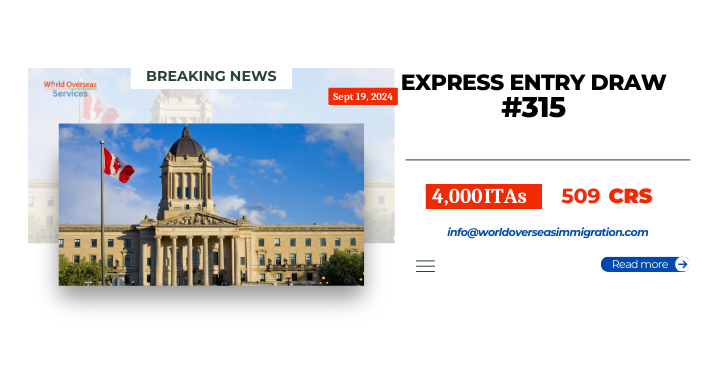Immigration, Refugees and Citizenship Canada (IRCC) has rolled out a number of changes that will affect all newcomers coming to Canada in 2024.
As announced in the Immigration Levels Plan for 2024-2026, Canada aims to welcome a total of 485,000 permanent residents (PR) in 2024. With this increased level of immigration, Canada is expected to launch updates to various programs and leverage Artificial Intelligence (AI) to streamline the customer experience.
Updates to the Express Entry System
In 2023, IRCC began conducting category-based Express Entry draws. These draws were implemented to help Canada find the most suitable foreign nationals to meet the country’s most pressing labour gaps and demographic needs.
Know if you are eligible for Canadian immigration
In the first year of category-based draws, IRCC decided to prioritize the following categories of immigration candidates.
- People with proficiency in the French language
- Have recent work experience in any of the following five industries: healthcare; science, engineering, technology and mathematics (STEM); trade, transportation and agri-food/agriculture
In 2024, IRCC is expected to continue to hold category-based draws. However, the department has made it clear that they will be re-evaluating the focus categories selected for 2023 and potentially changing them based on the changing needs of the Canadian labour market. This means that new sectors and skills may be selected by IRCC as areas of focus, potentially making new groups of newcomers eligible for category-based Express Entry draws this coming year.
New Provincial Nominee Program Guidelines
Provincial Nominee Programs (PNPs) are immigration pathways that allow local governments to select candidates who will best help them address labour market gaps. According to IRCC’s latest Immigration Levels Plan, the PNP is projected to become the country’s largest (by immigration targets) immigration pathway in 2024.
Recently the provinces have been provided a new set of guiding principles for PNP, which are detailed here.
IRCC is also introducing new multi-year plans for PNPs starting in 2024. This will help provinces and territories better plan their immigration strategies, as they will know their allocations for 2025 a year in advance.
Overall, these new developments by the PNP mean that prospective newcomers pursuing this immigration route will have a clearer picture of the options for immigrating to their province or region of choice, thanks to better planning by each regional government.
More places to enter the Parent and Grandparent Program
In 2023, Canada aims to welcome 28,5000 immigrants through the Parents and Grandparents Program (PGP).
In 2024, the latest Immigration Levels Plan indicates that the PGP target will increase to 32,000. Will IRCC prove capable of “improving admissions management and alignment [application] Based on “inputs and outputs”, more PGP applicants will be able to come to Canada in the coming year.
Enhancements to the Canadian International Student Program
To strengthen the integrity of the international student program across Canada and better protect incoming foreign nationals, IRCC has introduced an improved Letter of Acceptance (LOA) verification system, which will continue to affect all study permit applicants.
Starting on December 1 of this year, designated learning institutions (DLIs) across Canada will now be required to “confirm each applicant’s acceptance letter directly with IRCC.” The department says this “new, enhanced verification process is intended to protect prospective students from fraud while ensuring that study permits are only issued based on genuine LOAs.”
IRCC also announced in November that the department would review its Post-Graduation Work Permit (PGWP) program by 2024. Many international students who wish to apply for PR benefit from the PGWP, as the Comprehensive Ranking System (CRS) score considers Canadian work experience favourably.
The review is expected to introduce reforms to the IRCC “ [that] Calibrate better [PGWP] The country’s labour market needs as well as regional and French immigration targets will be taken into account.”
More: Be sure to stay updated with future stories from CICNews about this and other important developments for Canada’s international student population in 2024.
More changes to Canadian immigration coming next year
IRCC has committed to a number of other changes aimed at improving the experience and lives of Canadian newcomers going through the immigration process.
Increasing use of AI and technology
In an effort to “outcompete other countries for talent,” IRCC has committed to furthering the use of technology and AI in the immigration sector in 2024. The initiative aims to reduce processing times, improve tools for IRCC officers, help Canada meet the country’s immigration and diversity priorities.
Specifically, this digital transformation will improve the customer experience for immigration candidates in several ways, including but not limited to the following:
- Improvement in service standards
- Strengthening partnerships with employers and institutions that rely on immigration, while combating fraud and strengthening student and worker protections
- Making applications more user-friendly by using digital and virtual technologies
Comment: All of the above and other changes are part of Canada’s Digital Platform Modernization Initiative as outlined here
New IRCC Advisory Board
In addition, IRCC will develop a new advisory body to focus on matters related to immigration policy and service delivery. Uniquely, this board will include people “experienced in immigration,” giving newcomers to Canada a greater say in the programs and processes that affect them. This new advisory board hopes to “strengthen policy and program development” [while ensuring that Canada’s immigration system remains anchored] from a human-centered perspective.”
Introducing the Chief International Talent Officer
Finally, Canada’s immigration department will introduce a new role called the Chief International Talent Officer (CITO). Their primary responsibility is to improve the alignment between the country’s immigration system and its national labour market and regional strategies.
According to the department, “the responsibilities of [this individual] “This has the potential to make a huge difference to Canada’s annual immigration.” Potential immigrants to this country in 2024 and beyond should pay close attention to developments that occur after someone is appointed.
Know if you are eligible for Canadian immigration


